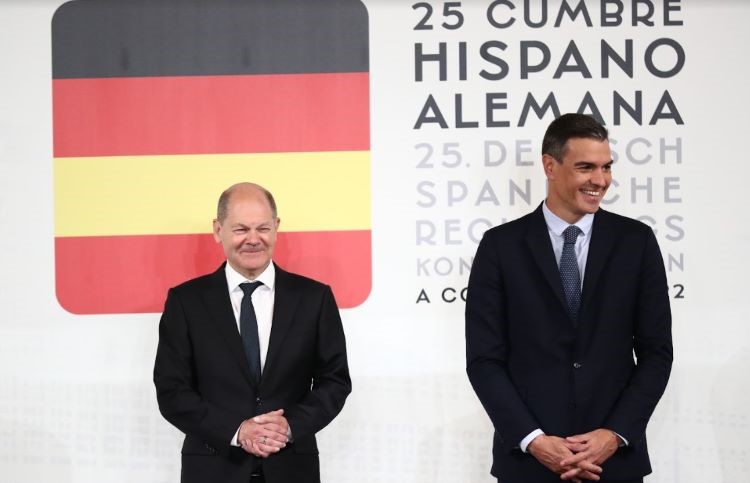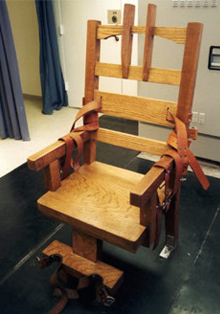Eduardo González
The Spanish-German Summit, held yesterday in A Coruña, did not address the possible participation of Spain in the joint European missile defense system led by Germany, but the President of the Government, Pedro Sánchez, pledged to “study it” when “it is the subject of debate”, as “it cannot be otherwise”.
A total of fifteen ministers from both countries participated yesterday in the twenty-fifth Spanish-German Summit, which addressed the major issues on the European and bilateral agenda, with special attention to the war in Ukraine and the reform of the European energy market. However, the preparations for the meeting were affected by statements made by the German ambassador in Spain, María Margarete Gosse, to Cadena SER in which she assured that the two countries were holding “low-level conversations” on the possible participation of Spain in the multilateral defense system led by Berlin and even implied that this issue could be discussed during the Summit in Galicia.
Following these statements, Moncloa assured in a press release that the Spanish Government had not “received any proposal or communication in this regard” and the Minister of Defense, Margarita Robles, declared that, “to date”, she had “no knowledge” of this alleged proposal which, “apparently”, is “still being studied by Germany”.
In the press conference after the bilateral summit, Pedro Sánchez declared yesterday that “the bilateral, European and NATO relationship between Germany and Spain is extraordinary and multiple”, but, at the same time, he assured that the issue of the anti-missile shield had not been “discussed” at the meeting in A Coruña. “It was not the subject of discussion, but, in any case, when it is the subject of debate we will study it, as it cannot be otherwise,” he added.
For his part, the German Chancellor, Olaf Sholz, assured at the same press conference that the issue of the shield had not been addressed, “nor was it on the agenda”, and specified that, in any case, it is a “political measure that has come out of Germany for the defense of Germany”, considering that it is “urgent” to provide the country with “an anti-aircraft defense shield” that also benefits, above all, “the neighboring countries”. “It is a challenge for many years, but we have not talked about it.” Last September, German Defense Minister Christine Lambrecht (present at the summit) told Reuters that her government’s goal is to reach an agreement with other NATO countries on the air defense system during the meeting to be held in Brussels on October 12-13.
The MidCat gas pipeline
On the other hand, Spain and Germany adopted yesterday a Joint Declaration that also includes an Action Plan annexed to it, in which the bilateral relationship is structured and renewed through multiple initiatives in different fields. In addition, the two governments signed two collaboration agreements on social and labor issues and on higher education and training.
The Joint Declaration reiterates the commitment of Spain and Germany “to the promotion of initiatives to increase the European Union’s capacity for action and to strengthen its resilience, complementarily with NATO and in a mutually reinforcing manner” and defends, in this sense, the importance of reinforcing cooperation in armaments and the defense industry to strengthen European capabilities in this area. The two countries also express their support for Ukraine and both governments express their desire to discuss and reach agreements on the future development of European fiscal rules.
The Joint Declaration also advocates “a greater interconnection capacity of the Iberian Peninsula to improve its contribution to the security of supply to the whole EU” and warns, therefore, that it is of “utmost importance” that the MidCat pipeline – which would connect the Iberian Peninsula with the rest of the EU through France – be operational by 2025. “The construction of a hydrogen-ready pipeline large enough through the Pyrenees to be operational in 2025 is of utmost importance to achieve a truly robust internal energy market within the EU, accelerate the green transition and reinforce the EU’s strategic autonomy,” the statement reads.
This position contradicts the position of French President Emmanuel Macron, who last September refused to give the go-ahead for this pipeline – despite having the backing of the European Commission – on the grounds that new gas interconnections with Spain are not needed because the current ones are far from saturation.
In this regard, Olaf Scholz assured at the press conference that it is necessary to “guarantee the supply” of both gas and hydrogen and, for this, “the MidCat pipeline is key to connect the Iberian Peninsula with central Europe”. For this reason, “I explicitly support the interconnection,” he added. “More interconnections are needed in Europe,” he insisted. “Something that may not be profitable now may be profitable later and, therefore, the best thing is to have that interconnection.”
For his part, Sánchez warned that “interconnections are good for France, for Germany and for Europe” and represent “greater peace of mind” because they provide “more energy alternatives” and help to put an end to energy dependence on Russia. “It would be a hydrogen corridor, not only of gas, and Spain wants to be in 2030 an exporting power of green hydrogen, of clean energy from renewables,” he added. This issue “does not concern the bilateral relations of the Iberian Peninsula with France, it is a European challenge,” he concluded.
The Summit was attended, on the Spanish side, by the three Vice-Presidents of the Government (Nadia Calviño, Yolanda Díaz and Teresa Ribera) and the Ministers of Foreign Affairs, Defense, Industry, Trade and Tourism; Agriculture, Fisheries and Food and Universities. Olaf Scholz was accompanied by the Vice Chancellor and Minister of Economics, Robert Habeck, and the Ministers of Finance, Foreign Affairs, Defense, Labor, Research and Science, and Agriculture.
The Summit took place on the eve of Pedro Sánchez’s official visit to Berlin, which will take place from October 13 to 15, and of King Philip VI’s state visit, who on October 18 will inaugurate the Frankfurt Book Fair with the German President, Frank Walter Steinmeier, at which Spain will be the guest of honor. On the other hand, at the end of August, Pedro Sánchez participated in a meeting of the German Council of Ministers, at the express invitation of Olaf Scholz, in order to share the experience of the Spanish government in drawing up its National Security Strategy.







